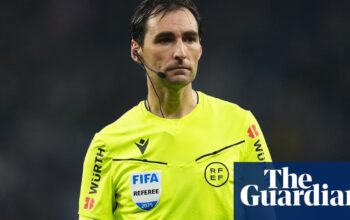Gala’s jubilant pop-dance banger Freed from Desire was a massive hit across Europe in the peak stadium-rave summer of 1996. But the story of the track was only just beginning. More than a decade later, it would become one of those rare pop songs to transcend its origins. Beginning a new life at Wigan Athletic football club in 2016 and going international via its adoption by Northern Ireland fans at the European Championships that year, it would become ubiquitous: an anthem for football fans the world over. Tune into any game of Euro 2024 this month and you’re likely to hear the song’s inescapably catchy “Na na na na na … ” chorus, accompanied by crowds gleefully leaping up and down. Freed from Desire has crossed over into other sports and into political demonstrations, too. But how did it happen?
Gala Rizzatto (Freed from Desire singer and co-writer) When I wrote Freed from Desire, I was living in New York. I was studying photography, which is how I got into music because I was photographing dancers, musicians and DJs. It’s a very personal song. Three things aligned. First, observation of society: in Italy and in Europe, you have a feeling growing up that we’re more or less all the same. But when you come to New York there are drastic differences: there is poverty, there are people who have nothing. And around the corner, there’s a billionaire. Second, my story of reconnecting with my passion, because in Italy, doctors told me that I could not dance because of a back problem so I could not follow my dreams. And the third level was falling in love. My first love was an African dancer, from Senegal. This guy arrives from Africa wanting to dance, living with no money in Harlem. And Harlem had music, they had dance, they had community. And all these three came together in a song that, to me, represents resilience and alignment with your passion.

Andrew Lawn (author of We Lose Every Week: The History of Football Chanting) Following football, unless you’re a fan of Man City, is often not successful in terms of trophies. So we need something else to sustain us and enjoy it and I think chanting does that – among other things – really well: anything that makes you feel good is going to have a chance to catch on. And nowadays the internet means inspiration can come from anywhere in the world.
Freed From Desire was being sung on the terraces from the early 2010s onwards – but its rise to ubiquity really started when a Wigan Athletic fan shared an ode to the club’s in-form Northern Irish striker, built around the memorable line “Will Grigg’s on fire, your defence is terrified” …
Sean Kennedy (Wigan-supporting YouTuber) We played Swindon away – it was Good Friday or Easter Monday 2016, and a few fans tried getting it going. When I got home I just did a video and uploaded it – the rest is history. It circulated pretty quickly – it was being sung the week after in the stadium.
Lawn Early on, chants were very parochial and specific to their area. The oldest, Norwich City’s song On the Ball City (sung at the turn of the 20th century), was written for a dinner event to celebrate sporting institutions in Norwich and was accompanied by a piano. In the 1960s things started to change and pop songs became the inspiration. Initially Liverpool’s Kop terrace would sing the songs of Cilla Black and the Beatles verbatim as they were so synonymous with their city. Over time they started to adapt the words. And once fans started travelling to away games on trains they would hear a chant and then adapt it for their club and take it away with them.
Gary McAllister (chairman of the Amalgamation of Northern Ireland Supporters’ Clubs) I remember seeing it on social media, the Wigan supporter with the tambourine. But the song just grew legs; it took on a life of its own around Northern Ireland in the Euro 2016 tournament in France. Will Grigg scored a goal in our last home game before the tournament against Belarus. And the moment the ball hit the back of the net, the whole stadium just erupted into the song.
Gala If you think about Will Grigg specifically, it’s funny because he is the underdog. And I was like: Oh my God! It couldn’t have happened to a better type of player. It didn’t start with Lionel Messi, it started with the underdog!
McAllister It really identified Northern Ireland within the tournament. I went over to France and fans from across Europe, when they saw me in a Northern Ireland shirt, would start singing the song. Everyone wanted to join in with it and it was actually a thing that connected a lot of people. When we lost to Germany in our last group game, the fans stayed behind after the match and the Germany and Northern Ireland fans sang it together for half an hour. But Grigg didn’t play in the tournament at all. When we played Wales in the last 16 in Paris, the Welsh fans were singing at us: “Will Grigg’s on fire, he hasn’t played a minute yet!” It just shows how a song can be adapted for a situation and sung back at you in a different context.
Gala I was in a cafe in Italy and there was a man drinking a beer and my song came on. And I heard him talking to the bartender and he said: “I like this song. I don’t really understand all of the lyrics but I feel like it’s talking about something important!” And that really stuck with me.
Soon fans across Europe were adapting Freed from Desire to the names of their own clubs’ stars. And it would spread to other sports – and even protest movements. At a National Education Union protest last year, striking teachers would chant “My pay’s no higher, Rishi Sunak is a liar” …
Lawn It has all the qualities you need. First it’s catchy and easy to remember and sing. Second, it has a structure that can be adapted to fit any number of places or player names. And third, it’s upbeat and jaunty, so you feel good singing along with it.
Polly James (Sky Sports darts presenter) It was so huge within football and I think the darts fans sort of hijacked it and adopted it as one of their own. It was a huge Euro-dance hit from 1996 and lots of us think back to the mid-90s and think: “What a time to be alive!” Those were the good times and we’re all living in shit now aren’t we?! Maybe a lot of people who go to the darts now remember growing up then going to clubs and not dealing with all the crap that we are these days!
Gala To me, it doesn’t matter who takes it. If you want to apply it to sport that’s OK. But while that was happening, in Paris, the song was used by women marchers, LGBTQ+ people, student protests against the government. So it has its own energy. I’m happy that people find joy in it. Imagine if a Nazi group had taken it up instead? It’s fantastic that it went to sport and to causes that align with my ideas about empowerment and pursuit of passion.
James With darts, it doesn’t seem for fans as if there’s lots on the line. In football, if your team loses you’ll be devastated. If Wales get dumped out of the Euros, you’ll see some poor guy in a bucket hat crying his eyes out. In darts, you’ll see someone getting a pint poured on their head instead. It always makes me laugh that darts is such a precision sport and you have to have the most immense focus to play it but in the minutes before the players go on, they’re having a rave. It doesn’t make sense! For some reason, we just like total chaos before the matches.
Gala At some point, it’s not yours any more. And in that sense, I love it. When art is out there, it becomes of the people. I really wanted to reach out to people.
Kennedy It’s an all-time classic, isn’t it? I mean, who doesn’t like that song? I’m up for doing a duet if Gala wants.
Source: theguardian.com


